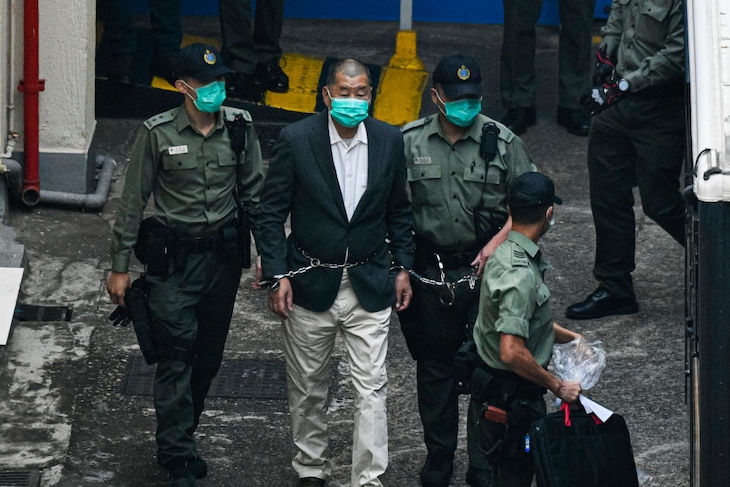There is something shameful about the government’s reluctance to publicly call for the release of Jimmy Lai, a British citizen and democracy campaigner, held in solitary confinement in Hong Kong. Lai, the founder of the pro-democracy newspaper Apple Daily, and one of the most prominent critics of China’s Communist Party, has languished in prison for more than 1,100 days. His trial, on national security charges, finally got underway today. Yet it is only now that a British minister has summoned up the courage to properly condemn Lai’s prosecution for the politically motivated sham it undoubtedly is.
Lord Cameron, the foreign secretary, said he was ‘gravely concerned’ about the trial, and joined the United States and European Union in calling for Lai’s immediate release. Britain should be leading the way in speaking up for the rights of its own citizens rather than belatedly following the lead set by other countries. Even so, better late than never.
To be fair to Cameron, he didn’t mince his words. He attacked Hong Kong’s national security law as a ‘clear breach’ of the Sino-British Joint Declaration, which returned Hong Kong from British to Chinese rule more than a quarter of a century ago. The deal pledged a high degree of autonomy for Hong Kong, including basic democratic freedoms, under the ‘one country, two systems’ formula. The foreign secretary was explicit about the corrosive effects of the new security law introduced in 2020:
‘It has damaged Hong Kong, with rights and freedoms significantly eroded. Arrests under the law have silenced opposition voices. I am gravely concerned that anyone is facing prosecution under the national security law, and particularly concerned at the politically-motivated prosecution of the British national Jimmy Lai.’
Britain should be leading the way in speaking up for the rights of its own citizens rather than belatedly following the lead set by other countries
No room for doubt there. Finally. It is unfortunate, to say the least, that it has taken our government so long to find its voice on this critical case. All for fear of upsetting Beijing. Ministers will deny this, of course, but what other explanation could there be for such political timidity?
The Lai trial is expected to last 80 days and the Hong Kong authorities are determined to make an example of him. Why? Because Lai, in fighting for democracy and freedom, epitomises everything that Hong Kong’s Chinese masters are determined to crush.
Lai’s Apple Daily newspaper was forced to shut down in 2021 after a crackdown on pro-democracy protesters. He faces various charges, including breaching national security and colluding with foreign forces. Lai, who denies all the charges, could receive a life sentence if found guilty. At every stage he has been denied his basic rights: the authorities refused his attempt to choose Timothy Owen KC, a senior British barrister, to represent him in court. His trial is being overseen by three judges hand-picked by the authorities.
Lai’s case matters because it is seen as a key test for Hong Kong’s judicial independence and wider freedoms under the national security law introduced by China in 2020. Beijing insists the national security law is necessary to quell unrest, and views Lai as a traitor who sought to undermine security. It is hard to view what has happened to Lai as anything other than yet one more example of Beijing’s tightening grip on Hong Kong.
British ministers should hang their heads in shame. Why did it take almost two years to make such a vocal condemnation of Lai’s treatment at the hands of the Hong Kong authorities? The government has always insisted that it is doing everything possible behind the scenes. It pointed to the then foreign secretary James Cleverly raising Lai’s case at the UN human rights council in February. This won’t do. It has been left to others, including the all-party parliamentary group on Hong Kong, to lead the way in calling for Lai to be a ‘political priority’ and demanding ‘targeted sanctions’ be imposed on the individuals responsible.
Lord Cameron, new to the job of Foreign Secretary and facing questions over his China policy during his time in Downing Street, is right to change course. He is demanding the immediate release of Jimmy Lai and an end to the political show trial in Hong Kong. It’s about time.







Comments